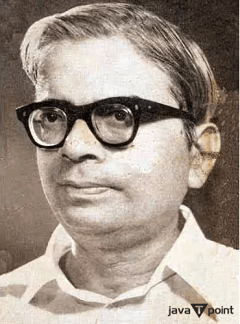Dhananjay Keer Ambedkar

Early Life and Background
Anant Viththal Keer, better known by his pen name Dhananjay Keer (1913-1984), was a well-known Indian biographer who rose to prominence for his portraits of important politicians and social activists. Mahatma Jyotiba Phule, B.R. Ambedkar, V.D. Savarkar, Bal Gangadhar Tilak, Rajarshi Shahu Maharaj, and Mahatma Gandhi are just a few of the significant people whose biographies he penned.
On April 23, 1913, Keer was born in Ratnagiri. Vithal (father) and Devaki (mother) raised him. He had six kids with his wife, Sudha. His thinking and worldview were greatly influenced by the revolutionary climate that prevailed in Ratnagiri in the early 1920s. He relocated to Mumbai in 1938 to serve for the Municipal Corporation of the city's Education Committee. He started his journey as a writer by making articles for the "Free Hindustan" magazine.
Vinayak Damodar Savarkar was the subject of Keer's first biography, released in 1950. He then wrote biographies of other significant individuals, including Dr. Ambedkar and Tilak. Keer's commitment to his biographical work caused him to quit his work position, which freed him up to write in-depth biographies of Gandhi, Shahu, and Phule.
It's also important to note that Keer and Savarkar worked together to build a temple in Ratnagiri, demonstrating his broad interest in cultural and social endeavors. The biographical writings of Dhananjay Keer have considerably improved our knowledge of prominent historical people who shaped India's social and political landscape. His dedication to documenting these leaders' lives has had a long-lasting effect on Indian biography and historiography.
Books
Let's tour some of Dhananjay Keer's thought-provoking and illuminating writings. He has helped us through written biographies to trace the lives, thoughts, and achievements of outstanding people who influenced the history of India. Each book presents a different viewpoint on these individuals' challenges, successes, and effects, from social reformers to liberation fighters. Let's explore the fascinating stories Keer's words have created for us and learn more about the lives of famous people who continue to influence and inspire us even today.
Here are some of the novels written by Keer, mentioned with brief introductions:
Marathi Books
- "Mahatma Jotirao Phule, Amchya Samajkrantiche Janak": Examines the life of Mahatma Phule, a trailblazing social reformer, stressing his forward-thinking initiatives to combat caste-based prejudice and promote social equality.
- "Dr. Babasaheb Ambedkar (1966)": A fascinating biography of Dr. B.R. Ambedkar, the designer of the Indian Constitution and a champion of caste equality, reveals his significant achievements in social justice and human rights.
- "Lokmanya Tilak and Rajarshi Shahu Maharaj's Ek Mulyamapan": Released in 1971, it discusses how Rajarshi Shahu Maharaj and Lokmanya Tilak's ideas and influence on India's social reform movements might be compared.
- "Vishwabhooshan Dr. Babasaheb Ambedkar, Manas Ani Tattvavichar": Reveals new insights into Dr. Ambedkar's philosophical approach and intellectual accomplishments, highlighting his strong beliefs in justice, equality, and humanity.
- "Mahatma Phule, Samagra Wangmay (1969) (co-editor S. G. Malshe)": A thorough compendium of Mahatma Phule's writings, co-edited by S. G. Malshe, showing his radical ideas and ground-breaking vision for an equitable society.
- "Krushnarao Arjun Keluskar, Atmacharitya va Charitya": Explores the life of Krishnarao Keluskar and focuses on his principles, commitment to selfless service, and philanthropic activities.
- "Rajarshi Shahu Chattrapati": Tells the story of Rajarshi Shahu Maharaj, a social reformer and trailblazing monarch, emphasizing his initiatives to advance education and elevate underprivileged groups.
- "Krutadnya Mi Krutartha Mi (autobiography)": Dhananjay Keer's autobiography conveys his appreciation and sense of indebtedness and gives an insight into the circumstances that created his amazing journey.
- "Lokhitkarte Babasaheb Bole": Examines Dr. Babasaheb Ambedkar's social activism and speeches, displaying his potent words that fought for the welfare of the underprivileged and marginalized.
- "Teen Mahan Saraswat (1979)": Depicts the lives and contributions of three significant members of the Saraswat group, stressing their influence on all facets of society.
- "Hyani Itihas Ghadawila (1980)": To give modern readers a new perspective on the past. With this writing, he delves into the unrecorded histories and narratives that inspired key events.
English Books
- "Veer Savarkar/Savarkar and His Times (1950)": A biography of Veer Savarkar that provides insights into his life and the historical setting in which he lived and is based on his interactions and interviews.
- "Dr. Ambedkar: Life and Mission (1954)": Provides a thorough description of Dr. B.R. Ambedkar's life journey, highlighting his contributions as a social reformer, jurist, and the creator of the Indian Constitution.
- "Lokmanya Tilak: Father of the Indian Freedom Struggle (1959)": Examines the life and contributions of Lokmanya Tilak, a well-known nationalist and freedom fighter who was a key figure in India's war for independence.
- "Mahatma Jotirao Phule: Father of the Indian Social Revolution (1964)": Recounts the events in Mahatma Phule's life, highlighting his ground-breaking efforts for social reform, education, and empowering underprivileged groups.
- "Mahatma Gandhi: Political Saint and Unarmed Prophet (1973)": Presents a distinctive viewpoint on Mahatma Gandhi, presenting him as a political saint who promoted nonviolence and brought independence to India.
- "Shahu Chattrapati: A Royal Revolutionary (1976)": Explores the life of Shahu Chattrapati, a royal visionary and social reformer, highlighting his initiatives to improve society.
Awards and Achievements
Dhananjay Keer received well-deserved distinctions and recognition for his outstanding services. He received the coveted Padma Bhushan medal in 1971 as recognition for his remarkable contributions and profound influence. This prestigious honor underlined his commitment to documenting the lives of significant people to illuminate their ideas and contributions.
Additionally, Dhananjay Keer received an honorary degree from Shivaji University in 1980. This honor recognized his outstanding intellectual achievements and his crucial contribution to safeguarding the legacy of remarkable individuals. Keer's achievements cemented his reputation as a renowned biographer and historian, and they were made possible by his persistent dedication to studies and his intimate understanding of the lives of visionary leaders.
|

 For Videos Join Our Youtube Channel: Join Now
For Videos Join Our Youtube Channel: Join Now









